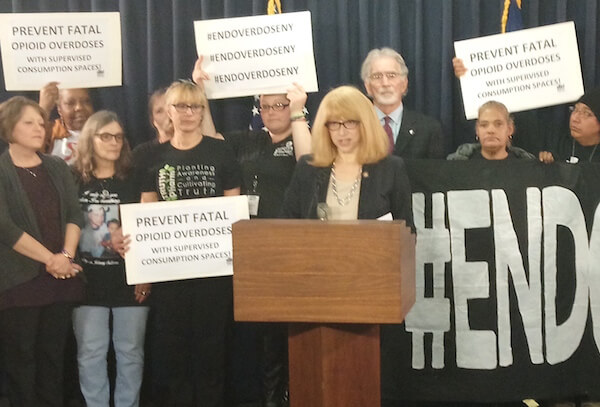Jane, Joseph, and James Clementi. | COURTESY: LUKE CABADING/ NEW YORK TIMES
Less than three years after the suicide of Tyler Clementi, a Rutgers freshman who jumped off the George Washington Bridge after being humiliated by his roommate who videocast him kissing another man, his parents and brother have created a foundation in his name working to end bullying in schools by fostering climates of mutual respect.
Jane and Joseph Clementi were joined by their son James, himself now a gay activist, and Steven Guy, the Tyler Clementi Foundation’s executive director, for a June 20 discussion moderated by out gay New York Times op-ed columnist Frank Bruni and hosted by the newspaper’s GLBT & Allies Network.
The prelude to the panel was a string quartet playing the mournful theme from “Schindler’s List,” but the Clementis were not there to relive the horror of losing Tyler at 18 but rather to talk about creating a positive future for LGBT youth and their families.
Tyler Clementi’s family explains the work of the foundation they created in his name
“We want to turn bystanders into upstanders,” said Joseph, speaking about how the response to bullying has to focus on much more than helping the bullied and punishing bullies. Those who witness cruelty and worse need to speak up and stop it, he said, or at least reach out immediately to those who are bullied and let them know they are respected.
“We want to create an infrastructure of support,” he said.
Joseph said Rutgers students exchanged 148 texts and tweets about the violation of Tyler’s privacy in its immediate wake.
“There was not one person who lifted a finger to help” Tyler, he said.
“That was what he was looking at before he left” to kill himself, Jane said.
James, who is Tyler’s older brother, said that “in 70 percent of bullying, there is a third-party observer witnessing it. They are responsible and have an obligation to end it.”
He added, “Tyler was being laughed at. No one said anything to him. He never heard he was supported in his environment — which could have changed the outcome of his decision.”
The foundation’s cause was not one the Clementis came to easily, but after being thrust into an international spotlight in the wake of Tyler’s suicide and the ensuing trial of Dharun Ravi (whose name was not mentioned at the forum), they had a choice between retreating and standing up. They chose the latter.
“It’s out of character for me,” Joseph said. “I can do this [kind of public event], but I prefer not to.” He may have “met a lot of great people” through his work with the foundation, but, “of course, I’d rather have Tyler here,” he said.
Thus far, Jane explained, the foundation has been “going to the low-hanging fruit — people who have been coming to us. As we branch out there may be conflict. I don’t like conflict.”
Wearing a necklace with a cross, Jane talked about one major conflict she has confronted — the one with her evangelical church.
“They did support us through a difficult time,” she said, and even though the family did not hear “fire and brimstone from the pulpit,” whenever homosexuality was mentioned it was not positively “and that’s not good for gay or straight people to hear — not even for 30 seconds. They still feel that homosexuality is a sin. I do not feel that.”
The family has left that church and is seeking another, but Jane said, “God never left me.”
James said he stopped going to the church in his “sophomore or junior year of high school” before he understood himself as gay. The youth group there, he said, “really focused on sexual immorality — and same-sex attractions were seen as the worst.”
James also expressed concern about the anti-gay messages fostered by the nation’s civic sphere, citing the 38 states that ban same-sex marriage.
Bruni asked if Jane’s action in leaving her church changed anyone’s attitude.
“I might have challenged their thinking,” she said, “but there was no change. There was also no hostility.”
Asked what schools can do to help their gay students, James responded, “You can’t wait until a student is in crisis. They need to know where to turn” from the first day of school. “They need to know that schools are safe spaces,” he added.
New York State has a school anti-bullying law and city schools observe a Respect for All Week to foster mutual support, but few work comprehensively to create climates of respect on a day-in, day-out basis — though there are exceptions.
The Clementis are particularly focused on higher education, which they feel has been neglected as anti-bullying programs grow in primary and secondary schools.
“Rutgers is working on best practices,” Jane said, including having more housing options and inquiring on housing applications, “Are you LGBT-friendly?”
The family worked with US Senator Frank Lautenberg, a New Jersey Democrat, up until his recent death on a federal Tyler Clementi Higher Education Anti-Harassment Act. The measure has not yet gotten through Congress — and has drawn some criticism that it compromises First Amendment rights — but will be brought up again in 2014.
Beyond the narrative of Tyler’s humiliation, I asked if the family could shed any more light on Tyler’s suicide. Jane said she is familiar with depression and did not perceive him as a depressive. Joseph spoke of Tyler’s penchant for “not asking for help” and being determined to “solve his problems on his own.” He conceded, however, that ultimately, “we have no way to know.”
Throughout the forum, the Clementis demonstrated how keenly they have grasped and how well they are able to convey the problem of anti-gay prejudice and bullying. Engaging bystanders and making kindness “cool” will be key concepts in their campaign. Turning their passion into concrete progress on things like legislation and institutional policies faces many hurdles. But their personal witness, wrought from bitter tragedy, is the biggest asset they bring to the fight.
Tyler Clementi's Death and the Wheels of Justice In March 2012, Dharun Ravi was convicted of all 15 counts he was indicted for related to his webcam spying on Tyler Clementi. He was sentenced to 30 days in jail, three years probation, and 300 hours of community service, given a $10,000 fine, and required to receive counseling on cyberbullying and sexual orientation issues.
Ravi served his sentence and is appealing the conviction. Prosecutors are appealing the lightness of the sentence. Those appeals are not expected to be heard until the middle of next year.
New York gay activist Bill Dobbs, who attended the trial but not the Times forum, wrote in an email, “Ravi’s wrongdoing was callous,” but he is critical of “how crime victims and their survivors are allowed far too much influence on the criminal justice system and [of] the wrong-headedness of hate crimes laws.”
Despite the help they got as survivors, Jane Clementi said the trial was “a frustrating time — it was like being trapped in re-runs of ‘Law and Order’ and I couldn’t wake up.”
Her husband, Joseph, said he was “basically satisfied with the way it was adjudicated,” but was surprised at the way sentencing was handled.
“Judges give suspended sentences all the time, though,” he added.



































